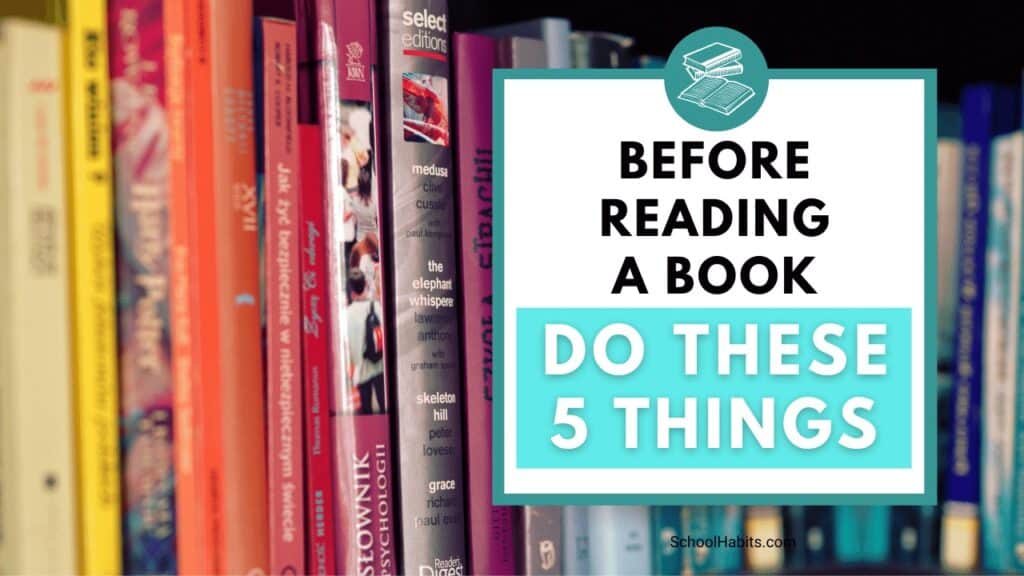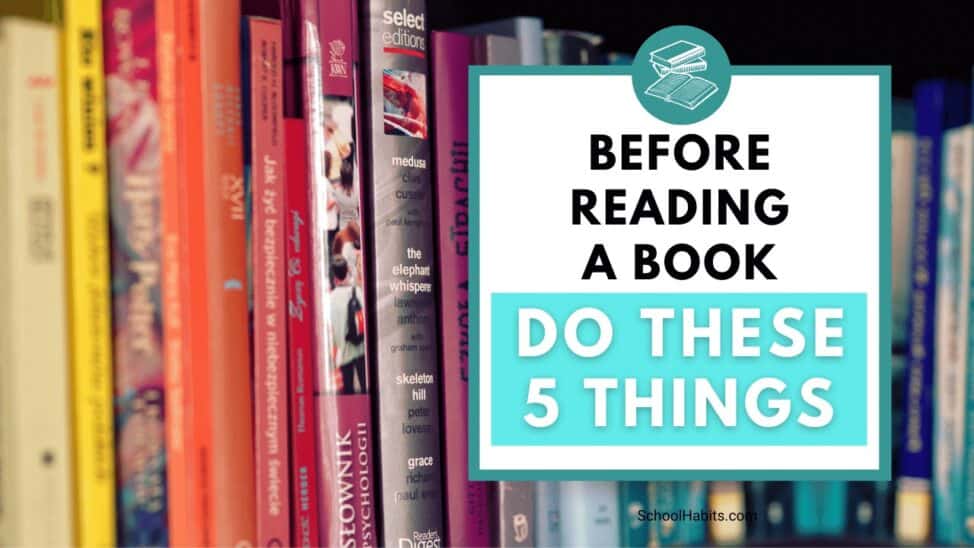
Whether you are reading for pleasure or for pain an assignment, there are five pre-reading steps that will enhance your entire reading experience. The steps don’t take long, they are simple, and they are completely worth it. I recommend that you eventually establish a habit of methodically running through these five steps before reading a book — actually, before reading every book you ever read.
Oh gosh, I know the suspense must be unbearable. Well then, here they are:
5 things you should do before reading a book
1. Psych yourself up
If you’ve personally selected the book you’re about to read, you’re likely already looking forward to cracking it open. You are one step ahead.
But if someone else has chosen the book for you, aka required reading, then you may not be bursting at the seams to get started.
Note: If you’re a parent and you’re struggling to get your child to read, these tips here are for you.
Here’s the thing: if it’s required reading, then you have to read it no matter what. You can’t change the book. But you are totally in control of how you feel about the book. And how you feel about the book will absolutely affect your experience of reading it.
If you pick up a book and think this is going to be the worst book ever, then yes, it will be the worst book ever. Even if it actually IS the worst book ever, you’re going to have to convince yourself that it’s not. Try to find one teeny tiny part that might not be miserable. And hold on to that. Mind games, people.
2. Understand the context
There’s nothing worse than walking into the middle of a conversation where you don’t know what the other people are talking about. Awkward. That’s kind of what happens every time you start a new book. Sure, the author is supposed to set the scene and give you what you need to follow along, but you’ll be doing yourself a favor with some research beforehand.
Before reading a book based on the 1950s, do a brief Internet search for what key events characterized the ‘50s. Before reading a book based in Vietnam or Malaysia, and you’re not from there, research those areas so you have a better understanding of the culture. Reading a book about Greek mythology? Google “Greek Gods” so you know who is who before getting started.
3. Learn something about the author
Who would you rather hear tell a story: a friend or a complete stranger? Most likely your friend. That’s because we care about what our friends care about. So before you begin reading a book, Google the author. What other books has s/he written? Is s/he still alive? Where is the author from? Did any personal tragedies influence the author’s literary output? I’m not suggesting that the author will become your friend if you learn a few facts about him or her (that’d be weird), but I’m suggesting that you might be more invested in the story if you know who’s telling it.
4. Make a reading schedule
This step might make more sense if you have a deadline for finishing your book. But even if you’re reading for pleasure, it can be helpful to have a schedule so that too much time doesn’t pass in between “reading sessions.”
Here’s how this works. It’s basic math, really. Get a calendar and determine how many days you have to finish the book (or in how many days you want to finish the book). Then count how many chapters are in the book. Divide this number by how many days you have to finish it. You might have to move some chapters around if there are certain days you know you won’t be reading, but you get the idea. Write down what chapters you will read on what days. For real though – write this down. And stick to this calendar. This concept is very similar to how I explain creating a study schedule.
Planning out your reading like this is not only a great time-management skill, but it’s also an effective stress-management skill. Knowing exactly what you need to read and when eliminates the dreadful “Ahh I have to read a whole book in one night!” situation.
5. Make a Character List
It can be helpful to keep track of a book’s characters from the beginning. Get a blank character list ready when you begin reading (you can use my free Character List template!), and fill it in as you go. In the first column (Character) write down a character’s name when they first appear in the story. The second column (Page) is where you write down the page number of every page where something important happens to the character. In the third column (Details) write down what you learn about the character throughout the book. Think in terms of who the character is related to, where they live, what their personality is like, etc.
Keep in mind that characters don’t have to be people. Sure, characters can be animals if that’s how the book is written, but characters can also be symbols that reappear throughout the story. Examples include the blinking green light in The Great Gatsby, the wolves in Sword of Summer, the sea in Homer, the seasons in Shakespeare, Luke SkyWalker’s white outfit and Darth Vader’s black outfit in Star Wars (yes, colors can be symbols/characters). In your Character List, write down everything that takes on a life of its own in the story. If you later decide that what you thought was a “character” is really not one, then remove it from the list.
Keep this Character List with you as a reference as you read, and add to it as needed. You can also revise the list as you go, because sometimes we make assumptions about a character (he’s bad!) but later find out we were wrong (he’s actually the hero!).
As a bonus, the Character List is handy to have if you need to write an essay about the book. You’ll know exactly on what page to find and reference key events.
So there you have it – the five most important things you should do before reading a book. Any book. Ever. I challenge you to try them. And if you will be having a test on the book, here’s exactly how to study for a test on a book.

